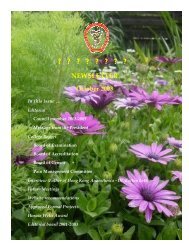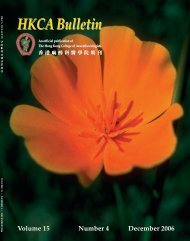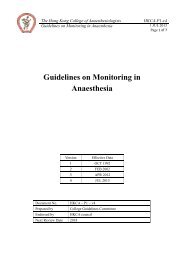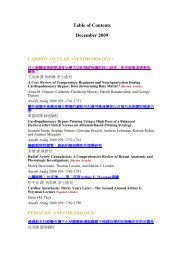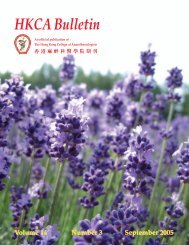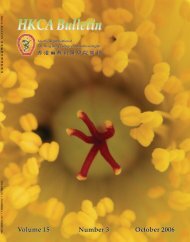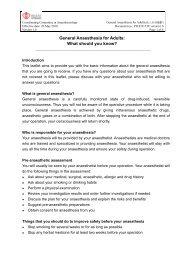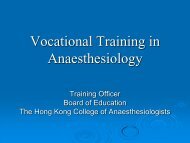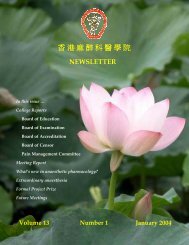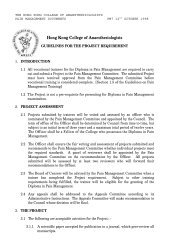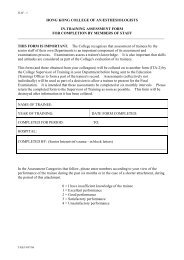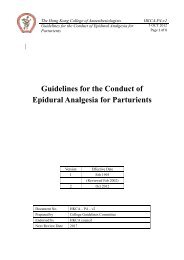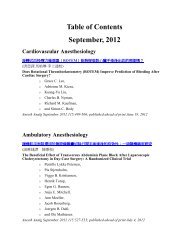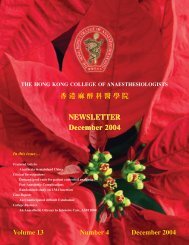Bull HK Coll Anaesthesiol Volume 14, Number 2 <strong>July</strong>, <strong>2005</strong>Featured articleOutside Qualified <strong>Anaesthesiologists</strong> Working In China (1)1Anne KwanDepartment <strong>of</strong> Anaesthesia, United Christian Hospital, <strong>Hong</strong> <strong>Kong</strong> Special Administrative RegionBull HK Coll Anaesthesiol <strong>2005</strong>;14:67‐70After 1997, it has become a reality or evennecessity for the medical pr<strong>of</strong>essionalqualified in <strong>Hong</strong> <strong>Kong</strong> to engage inclinical work in China. <strong>The</strong> healthcaredevelopment in <strong>Hong</strong> <strong>Kong</strong> has followed theBritish system closely and a lot <strong>of</strong> adjustmentsare required for the <strong>Hong</strong> <strong>Kong</strong> trained doctorsto practice in Mainland. <strong>The</strong> differences inhealth care are the result <strong>of</strong> the unique nature <strong>of</strong>the political system in China, the vastness <strong>of</strong> thecountry, the extremes <strong>of</strong> wealth distribution andthe language medium in teaching and day today communication.Despite the introduction <strong>of</strong> Closer EconomicPartnership Arrangement (CEPA), medicalpr<strong>of</strong>essionals qualified in <strong>Hong</strong> <strong>Kong</strong> are notgranted with recognition and full registrationwith the relevant medical bodies in China.However, it is still possible to perform clinicalwork in there by having limited registration.<strong>The</strong> registration can be arranged by a receivingunit. <strong>The</strong> unit which is usually a hospital or theRed Cross, after vetting the qualifications <strong>of</strong> thedoctor then issues a letter <strong>of</strong> invitation. <strong>The</strong>letter <strong>of</strong> invitation would specify the name <strong>of</strong> theinvitee, nature <strong>of</strong> the work and the period. Most<strong>of</strong> the work is on a voluntary basis as the pay <strong>of</strong>1MB BS, FANZCA, FHKCA, Dip Pal Med, Dip PainMgt (HKCA) FHKAM (Anaesthesiology), Dip Epi &Biostat, Dip Acup, M Pal Care, Consultant and Chief<strong>of</strong> Service. Department <strong>of</strong> Anaesthesia United ChristianHospital.Address correspondence to: Dr Anne Kwan,Department <strong>of</strong> Anaesthesia, United ChristianHospital, 130 Hip Wo Street, Kowloon. E‐mail:askkwan@yahoo.com.hka doctor in China is still not attractive ascompared to that in <strong>Hong</strong> <strong>Kong</strong>. Before onecommences work, it is sensible to obtain medicalprotection cover for clinical malpractice. <strong>The</strong>cover can usually be arranged by theindividual’s own medical protectionorganization such as the Medical Defense Unionor the Medical Protection Society before leaving<strong>Hong</strong> <strong>Kong</strong>. If the duration is not too long, theadditional cover is usually provided free as part<strong>of</strong> one’s existing insurance package.Despite Putonghua being the <strong>of</strong>ficial spokenlanguage, it is likely that one would come acrossmany local dialects and communication can be areal problem even if you are pr<strong>of</strong>icient inPutonghua. <strong>The</strong> <strong>of</strong>ficial written language issimplified Chinese characters. It is not unusualfor the local to look puzzled when traditionalChinese characters are used. <strong>The</strong> staff at themajor teaching hospitals in the big cities wouldknow English but on the other hand having aninterpreter around could be helpful. It is also agood idea to learn about the hospital one isgoing to work in. Apart from the physicalenvironment, it is important to know thequalification and experience <strong>of</strong> the staff. <strong>The</strong>information on availability and charge <strong>of</strong> themedical equipment, drugs and blood and/orproducts are also helpful for one to get to knowthe system quickly.Although most parts <strong>of</strong> China are still ratherslow and under developed, rapid progress isbeing made in improving the living standards <strong>of</strong>her people. <strong>The</strong> improvement in the health caresector is noticeable but the downside is that <strong>of</strong>high health care cost. Health care service inChina is not free. Patients are paying an67
Bull HK Coll Anaesthesiol Volume 14, Number 2 <strong>July</strong>, <strong>2005</strong>escalating fee for the service. In order to avoidpayment defaults, a deposit <strong>of</strong> substantialamount is required on admission to the hospital,including emergency admissions. <strong>The</strong> cost iscalculated on the number <strong>of</strong> days stay, the type<strong>of</strong> hospital ward, the use <strong>of</strong> drugs and otherequipment, the number <strong>of</strong> investigationprocedures and nature <strong>of</strong> operation. <strong>The</strong> totalcost can mount up to an astronomical amount.Some patients actually opt not to be treatedbecause <strong>of</strong> the high and unaffordable cost.My interpretation <strong>of</strong> the Chinese medicalsystem may not reflect the places I have notbeen to as China is obviously a vast countrywith varying health care set ups and clinicalpractices. I would like to also mention that thereare a few anaesthesiologists in <strong>Hong</strong> <strong>Kong</strong>, whogo up to China to observe, work, and help withthe training <strong>of</strong> local specialists for short periods<strong>of</strong> time on a regular basis like me. Although thehospitals we went to might be similar, we mighthave slightly different experience and interpretour experience in a different manner. I wouldlike to further point out that most <strong>of</strong> thehospitals I worked in were in the Henanprovince. Henan province is the second largestprovince in China and it has a population <strong>of</strong> 100million. Before I go on to share my limitedexperience <strong>of</strong> my clinical practice in China, Iwould like to briefly explain the few uniquesystems in there. China has unique setup for thehospital system, the training <strong>of</strong> specialists, andthe billing <strong>of</strong> patients. Also, one must appreciatethe special Chinese social culture in order tomake your work and stay more enjoyable there.<strong>The</strong> hospital system<strong>The</strong>re are different types <strong>of</strong> hospitals in China.Although the hospitals are not classified intopublic and private hospitals as such, they are allessentially private hospitals as all patients arebilled for the health care services they receive.All the services are itemized and I would furtherexplain how billing is done in the other section<strong>of</strong> this article.Generally, there are two types <strong>of</strong> hospitals,the Western medicine hospitals and the Chinesemedicine hospitals. However, it is notuncommon to have a department <strong>of</strong> Chinesemedicine in the western medicine hospitals andvice versa. Some <strong>of</strong> the pharmacy departmentshave two divisions, namely the western drugdivision and the Chinese herbal division. If onewonders around the hospitals, be it named aswestern or Chinese medicine hospital, one canfollow the smell <strong>of</strong> herbs and find clay pots withherbs on the hot stoves. Some hospitals <strong>of</strong>ferhigh tech herbal medicine dispensing bypreparing the herbs in electrically heated urnsfor the patients before hand and have themdistributed in plastic containers to take home forconsumption.<strong>The</strong> other naming system one <strong>of</strong>ten finds isthe use <strong>of</strong> names such as people’s hospital,military hospital, factory hospital, unionhospital and Red Cross hospital. All thesehospitals are public hospitals (or should we callthem private hospitals). <strong>The</strong> names reflect theassociation <strong>of</strong> the hospitals with the foundingorganizations. <strong>The</strong> association could have beenbroken some years back and the name remains.Hospitals called by the name <strong>of</strong> the city thenfollowed by a number (first, second or third etc.)are hospitals built by the government or theywere renamed after the culture revolution. Somehospitals are run by the locals with a team <strong>of</strong>medical experts from overseas and they arereferred as the collaboration hospitals.<strong>The</strong> clinical classification <strong>of</strong> the hospitals ismost easily understood by the ABCcategorization. All hospitals are categorized intoone <strong>of</strong> the followings: AAA, AAB, AAC, ABB,ABC, ACC, BBB, BBC, BCC, or CCC. “A”denotes the best in its class and “C” the lowestlevel. A major teaching hospital must be anAAA institution and a local small hospital withonly a few run down clinics would be a CCChealth care centre. <strong>The</strong> hospitals have to meetthe performance targets before they are grantedthe level <strong>of</strong> competence they claimed. Inspectionis carried out periodically to see if the criteriaare met. Some <strong>of</strong> the criteria the authority looksfor are the provision <strong>of</strong> accident and emergencyservice, cardiovascular surgery andneurosurgery. Other criteria are the procession<strong>of</strong> hardware such as all sorts <strong>of</strong> endoscopies, CT68



